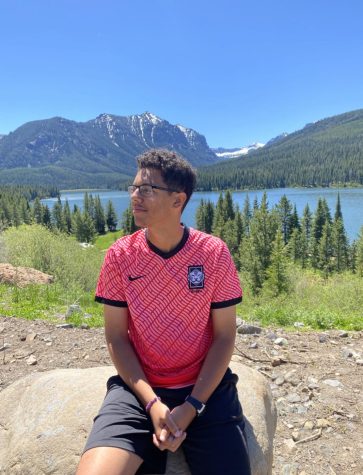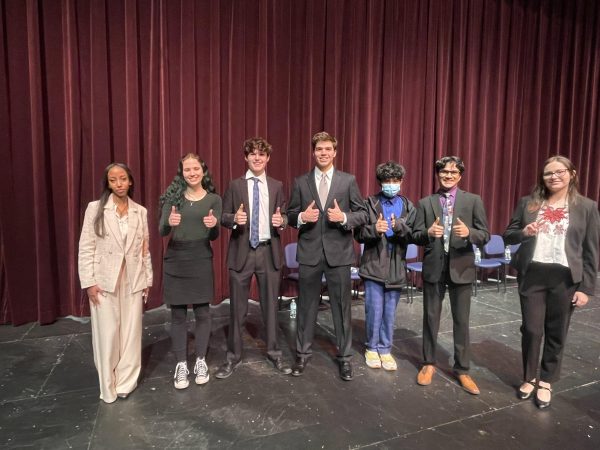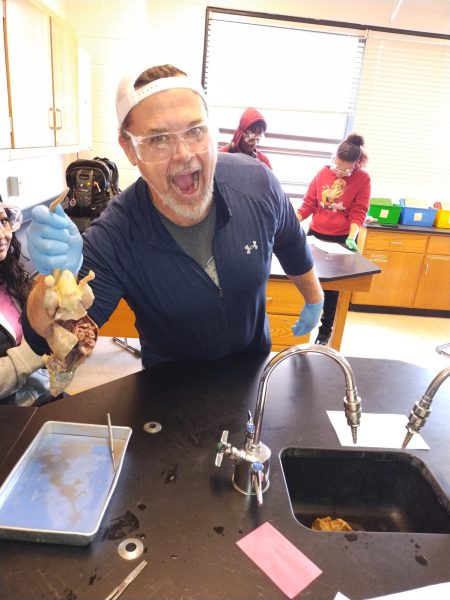Meet SMOB 2023-24 candidate Sami Saeed
Meet Sami Saeed, student at Richard Montgomery High School and candidate for Student Member of the Board of Education.
On Wednesday, February 15, delegates from Montgomery County middle and high schools came to Watkins Mill to nominate two finalists for the forty-sixth Student Member of the Board of Education (SMOB).
Juniors Sami Saeed from Richard Montgomery High School and Yoseph Zerihun from Springbrook High School were selected as the two finalists in the SMOB election.
Saeed will visit Watkins Mill next Tuesday, March 14 during lunch.
Disclaimer: The Current is not endorsing Sami Saeed in his candidacy for SMOB. The purpose of this article is to inform the community of his policies and provide insight into who he is as a student, leader, and candidate. An article about the other candidate, Yoseph Zerihun, was published on Monday, March 13.
[ez-toc]
Personal – Get to Know Sami, the Student
Sami Saeed is a junior at Richard Montgomery High School (RMHS), who also serves as his school’s Student Government Association (SGA) President. He loves advocacy, researching, and debate, and was on RMHS’ debate team for two years, helping his team win the Montgomery County Public Forum Debate League. When he has free time, Saeed can be caught watching movies and hanging out with his friends.
His favorite movie is an American epic war film called Apocalypse Now. “I just think it’s such a good deep dive into the psychology of people,” Saeed said. “It’s a great movie to just really immerse yourself in and it’s like three and half hours long, which is crazy.”
Saeed maintains a cumulative list of all the movies he has ever watched in his life, which has amassed to about 1,000 movies.
He has two pets: a dog named Neo, and a cat named Milo, whom Saeed’s sister rescued from under a generator at the University of Maryland.
Saeed likes to keep himself busy. “I love to be doing something every second of the day,” Saeed added. “I’m always working, I’m always doing something because it makes me feel productive.”
Unlike several past SMOBs, Saeed did not start his advocacy career until high school. “I really got involved a lot more recently, and then realized how easy it was to really make change and the fact that change wasn’t being made enough,” Saeed said. “I wanted to be the one to step up to do it.”
Saeed is involved in both current SMOB Arvin Kim’s Advisory Cabinet and Board of Education (BOE) At-Large Member Lynne Harris’ internship, where he gains direct experience with working with people already on the BOE. Serving on Kim’s Advisory Cabinet, in particular, has shown him on a firsthand basis how students influence a SMOB and how the student voice can be represented.
With meetings twice a week and commitments to arduous work, intense research, and emphasis on teamwork, Saeed credits his participation in RMHS’ debate team for his development of strong communication, research skills, and being a team player.
Saeed also used to write articles for The Tide—Richard Montgomery’s newspaper—and played non-school-affiliated soccer for eight to nine years.
Why SMOB?
Winning the Debate League helped Saeed realize that he possessed a strong ability to communicate and wanted to use that towards something positive.
After running for several positions in the school community, like Class President and SGA President, and delivering on his promise to bring back school spirit from COVID, “I was kind of realizing that wow, I actually have the opportunity to really make change,” Saeed said
Saeed discovered that he “could be like our past leaders, [and that] there isn’t some [formula] you have to know to be able to do it, which is kind of what I thought for the longest time,” Saeed said. “The average student really can step up and try and make that change. So I decided to do that and…run for SMOB.”
Following this realization, Saeed also acknowledged that “there [were] huge inequities in who had the opportunity to do that,” and Richard Montgomery—his own school—is overrepresented in several advocacy organizations. (Editor’s Note: More information about Saeed’s policies regarding underrepresentation in MCPS can be found in ‘Student Representation and Changes to Advocacy Organizations’)
“I wanted to…not to speak on behalf of people, but to give them the opportunity to speak for themselves,” Saeed added.
The title is “‘Student Member of the Board of Education,’ but I think the most important part of that is ‘student,’” Saeed said.
According to Saeed, students bring their own unique perspective because “parents, they’re not the ones in the building, and we see things that no one else can see.”
“I think on the Board of Education, the student voice, in my personal opinion, is the most valuable voice on there,” Saeed added, “because the education system is made to serve students. The buildings are to house students, the curriculum is to teach students. So that student perspective is the key perspective.”
Opioid Crisis
Saeed is an advocate for the implementation of Narcan becoming more widely available to students around Montgomery County as a temporary solution.
According to the Center for Disease Control and Prevention (CDC), Narcan, or naloxone, is “a life saving medication that can reverse an overdose from opioids—including heroin, fentanyl, and prescription opioid medications—when given in time.”
However, to Saeed, Narcan isn’t a long-term solution to the opioid crisis in MCPS. “Narcan is…a reactive plan. I don’t see this as a long-term solution,” Saeed said. “But the problem [of drug use] has gotten so bad that we need to do this.”
Saeed believes that drug use “is a mental health problem, not a disciplinary problem.”
MCPS held a workshop on January 28, which included an expert panel discussion and an emergency Narcan training and distribution. According to the CDC, Narcan is not addictive and is safe to use, making it more safe for MCPS students to have access to. “[The training to use Narcan] is pretty self intuitive, it’s super basic,” Saeed added.
According to Fox 5 News, Narcan has been used 11 times in MCPS schools between August 29, 2022 and January 26, 2023. In a note sent to MCPS families, an overdose at John F. Kennedy High School was described as a ‘medical emergency’.
Saeed plans to increase the frequency at which students are surveyed about drug usage by students. “If you ask questions…the Board of Education would be insanely surprised about how vast the problem [of drug use] is.” Saeed said.
“I think that if we just had more conversations and less straight up punishments, our opinion, [our views] on drug use in the county, and the stigma that we have on it could change—if we could move towards focusing on rehabilitation, I really think that’s the key thing,” Saeed said.
Weapons-related Incidents
Saeed acknowledges that the increase in weapon-related incidents in MCPS is a major concern for students.
“When people are bringing guns into your school, when there’s stabbing happening around the county, that really makes you question every single day [when] is [a weapon-related incident] going to happen?” Saeed said. “Not if [a weapon-related incident is] going to happen, [but] what is going to happen and am I going to be okay?”
Although weapon-related incidents have increased in MCPS, Saeed sees a solution. “I have seen the restorative justice approach actually increase,” Saeed said. “I’ve heard students getting suspended a lot less, which I think is great.”
If there’s one area that Saeed thinks MCPS can move funding away from, it’s the Student Resource Officer (SRO) program. According to Saeed, that money could be supplied towards mental health services, counselors or rehabilitation, and restorative justice that may “cause [SROs] to not even [need to be] there in the first place.”
Mental Health
Saeed wants to push for hiring more social workers in MCPS, as well as the expansion of resources that wellness centers within MCPS have.
“[The expansion of wellness centers in schools] is a really positive change,” Saeed said. “I give the county a lot of credit for taking initiative and implementing those policies [on mental health services]. I think that’s really fantastic.”
Speaking out about mental health is also important to Saeed. “Mental health is probably the biggest thing I’ve seen grow as a concern from when I was in middle school to now.” Saeed said. “We need to be utilizing [mental health] resources.”
Racial Inequity in Schools and Curriculum
“Being Arab American, I have faced blatant racism throughout middle school,” Saeed said. “I’ve been called a terrorist [and other slurs]. Those incidents still sometimes happen. I’ve seen friends of mine [have the] same thing [happen] to them.”
Experiences like this showed him that students of color face hardships not only socially, but also structurally. There is a lack of representation of people of color (POC) in MCPS’ curriculum and staff. Saeed also points out how schools with high POC populations are often underfunded and ignored.
Saeed thinks that, over the last several years, the curriculum in MCPS has become more inclusive, but he still wants to move away from a Eurocentric focus to one of more diversity, including history from different parts of the world.
Student Representation and Changes to Advocacy Organizations
Another one of Saeed’s policies is to increase the involvement of all schools in student leadership organizations, such as the Montgomery County Regional Student Government Association (MCR).
Saeed believes that Watkins Mill is “definitely an underrepresented school. I know that my most beneficial policy would be my changes to leadership organizations,” Saeed said.
“A lot of students have drive and passion, sometimes drive and passion that they don’t even know about,” Saeed said. “The reason it’s not utilized is because they don’t know about the opportunities they have.”
Saeed describes how the students who become involved with MCR and its middle school counterpart, Montgomery County Junior Council Student Government Association (MCJC), enter a pathway to leadership positions. Frequently, however, only students from certain schools are able to get involved.
“I think what really makes me unique is I was never a part of that inner circle…Most people who are in the system, they don’t want to change because…they don’t want to lose power or they don’t want their friends to lose power. And that’s really what I think makes myself different,” Saeed said.
“I’m willing to step up and say that I want to put limits on the number of students per school that join [MCR’s] Executive Board,” Saeed added. “I acknowledge that I would even be limiting RM’s power…but I’m totally okay with doing that. I’m okay with making sure our county’s equitable.”
Saeed hopes to bring surveys into the classrooms in order to reach as many students as possible. “[Surveying is] the first step in bringing students that are already passionate but simply have no outlet to express their passion,” Saeed said. “[Surveying] is the way that we’re going to be able to get those students [in order] to hear their voices in the first place.”
Every year, the BOE always requests a bigger budget from the County Council, so Saeed thinks that if MCPS receives more money, “we have to survey students on where that money should be going. We have to survey them on those key areas. And that’s where we’re going to find the areas that we need [to fund].”
“If I think something [and] poll students, and we find 90 percent of them think something else. I’m going to go with the students because it’s not necessarily about what I think,” Saeed said. “Obviously, I have plans and solutions, but those were all created from what I heard from students.”
Record of Action
Given that school lunch is the only meal some students eat a day, Saeed ensured it was a big part of his candidate platform. He noticed this issue first at his own school and then worked with MCPS officials to organize a student taste-testing event for RMHS students.
“I think a big thing that separates me is I’m not just making promises, but I’m taking action and I’m not even SMOB yet,” Saeed said. “This really shows that if I’m already taking action now, imagine what I can do on the Board of Education.”
Saeed’s experience with the Montgomery County Commission on Youth and Children to bring more equity towards English for Speakers of Other Languages (ESOL) students and students with disabilities taught him how to work with adults and youth commissioners.
“When you just look at my record of action, it is consistent. And it is real, tangible change that I’ve always promised to make and I’m already making,” Saeed added.
Regarding the drug overdose crisis, Saeed gave a testimony and reached out to several officials in MCPS, including the chief medical officer, to collaborate and discuss solutions in meetings. Saeed emphasized to them how there needs to be slides presented to students in classes, as opposed to just a newsletter sent via email. He then worked with one of his graphic designers to create a design for the slides, sent it to the MCPS officials, and is currently trying to integrate those slides into English classes.
Watkins Mill
Saeed has made it a goal to visit every high school in Montgomery County, including Watkins Mill, and as many middle schools as possible. “A unique effort I’ve made is to reach out to every single community,” Saeed said. “My goal is to be able to bring students from Watkins Mill, their perspectives and interests into my policy. That’s why I created all my policies.”
Saeed often looks to incorporate the student voice into his policymaking. “Usually when I look at policies specific to schools… I literally say ‘what is an issue in your school that you really care about?’” Saeed said.
Saeed plans to visit Watkins Mill during lunch on Tuesday, March 14. He also hopes to talk to as many Watkins Mill students as possible during this visit. “I want to ask [Watkins Mill students], ‘is there one specific or even a number of issues you see?’”
Saeed believes that it is important to make genuine connections with students in order to best represent their interests. “I’m… not going to make up an issue that Watkins Mill has and speak on it,” Saeed said. “But what I do when I go to schools, I listen to students. That’s all I’m here for is listening. I absorb that information and I create a policy from it.”
Saeed wants to work with community leaders to guide students through the student leadership pathways. “Every single student [has] a story, they have an experience and they have some sort of passion,” Saeed said. “It’s just whether they have the outreach to be able to express that [passion] or be able to use that passion towards making change.”
Saeed does not believe that there is a difference between students from different schools. “It’s not like a Richard Montgomery student and a Watkins Mill student are different in any sort of way,” Saeed said. “They’re the same student. It’s just the building they’re placed in—do they have the same opportunities to create change?”
“Watkins Mill students and all students can trust that I will represent them and listen to them and bring their perspectives to the Board of Education,” Saeed added.
Accomplishments and Goals
Saeed was surprised about his ability to create change within his community and planning a school lunch taste testing at Richard Montgomery “showed me, weirdly, how easy it is to create changes,” Saeed said. “I literally said, ‘I want better school lunches, and I want to have students approve these lunches beforehand.’”
Saeed also feels that one of his biggest strengths is his ability to make connections with county officials. “I think my ability to network and create change directly with leaders is super helpful,” Saeed said. “Any sort of event I go [to], I create those connections and I’m able to make change.”
“Once I get elected SMOB, I’m going to have a huge access to the people running the county,” Saeed added. “That means I’m going to be having a huge access to outlets for change.”
Final Message
Saeed’s final message is to students who want to make change in their communities. “I really am a student, just like everyone,” Saeed said.
“When I was younger I looked upon these leaders as some big thing that I could never do.” Saeed said. “I want to leave saying every single student has the ability to make change.”
“If you’re passionate, if you care, no matter what you look like, no matter where you come from, you have the ability to make change.” Saeed said. “[As SMOB], I would work to ensure that what you look like and where you live does not determine your opportunities.
“View me as a reflection, a representation of the 87,000 middle and high school students or the 160,000 students in general,” Saeed said. “I just want [every student] to know that I’m not focused on what I believe, but I’m focused on representing what the students believe.”
“The student voice is key, and any student can rise up and be a leader,” Saeed said.
Your donation will support the student journalists of Watkins Mill High School. Your contribution will allow us to purchase equipment and cover our annual website hosting costs.

Ashley is an IB Diploma senior at Watkins Mill High School and Co-Editor-in-Chief for The Current, who adores books and calligraphy. She is President...

Julien Payen is a senior at Watkins Mill High School. He is the Co-Editor-in-Chief and photography director for The Current. He plays tennis (go 'Rines!)...














BJ Bordon • Mar 10, 2023 at 2:18 pm
What a comprehensive and informative piece on the SMOB’s platform. Thank you for getting this out to MCPS Students!
Julien Payen • Mar 14, 2023 at 8:31 am
Thank you for the kind words BJ!